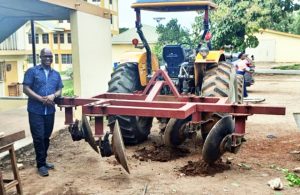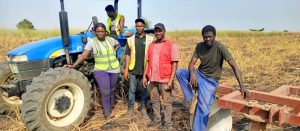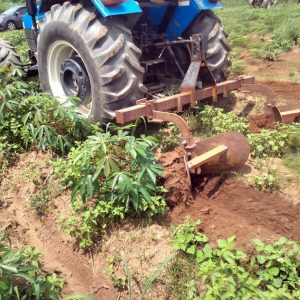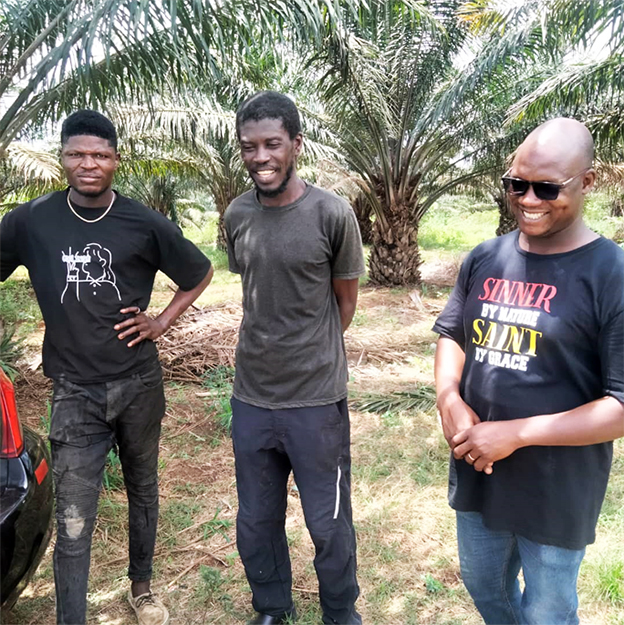Two Graduate Students of the Department of Agricultural and Biosystems Engineering of the Kwame Nkrumah University of Science and Technology (KNUST) have separately designed and developed a Double-Row Disc Ridger and a Moldboard plough (Ridger) to ease the burden associated with root crops production, especially cassava, by farmers.

The Double-Row Disc and the Moldboard plough Ridgers are capable of eliminating the most difficult stages that local farmers have to go through in the cultivation and harvesting of cassava (Manihotesculenta), which is a leading staple crop in many parts of the world, particularly in the Tropics.
Mr David Amidu Wandusim, a PhD student in Agricultural Machinery Engineering designed and developed the performance evaluation of a Double-Row Disc ridger, while Mr. Kwabena AgyemanA bebrese, a Master of Philosophy (MPhil) Agricultural Machinery Engineering student of the same department also worked and developed the Mouldboard Plough or ridger.
During a field demonstration at the KNUST Agricultural Station, near Anwomaso recently, Mr.Wandusim explained to The Chronicle that the introduction of cassava mechanical harvesters has brought a breakthrough in root and tuber crops production, as it has largely reduced drudgery associated with manual harvesting, especially with a potential increase in global cassava production.

Ridging, he explained, is a mechanised alternative to mounding and flat-land forms and can be done manually, but practical evidence suggests that manual ridging is expensive, laborious, time-consuming and limits the scale of production, hence the need for the innovation to be able to develop seedbeds to accommodate root crops production and effective use of the cassava harvester.
Mr Wandusim said the development of the KNUST Double-Row Disc ridger is not an invention but fabricated from locally available materials and tools, which makes it adaptable, resilient and affordable technology to enhance mechanisation of root and tuber crop production for small-scale farmers in the country.
Manual labour, it is said, is inadequate in cassava growing areas due to rural-urban migration and is currently estimated to cost the farmer between GH¢500.00 to GH¢1,600.00 to weed an acre of a cassava field using manual labour and the ridger has been found through the demonstration, to be useful for weeding purposes.
He also explained that unlike the existing Disc ridgers, furrows produced by the KNUST Double-Row Disc ridger are wide enough to accommodate the track width of a standard wheel-tractor, which makes it possible for mechanical harvesting of root and tuber crops and also enhance efficiency.

Mr. Kwabena Agyeman Abebrese, who developed the Mouldboard Plough (ridger) explained that the plough was not originally designed at the KNUST, but the department is redeveloping it to see if it can help the local farmers to use it in weeding their farms and also to experiment the possibility of using it for other purposes like ridging, so that it could become an all round machinery for the entire process of production and also encourage those who intend to go into large scale cassava production.
He said the Mouldboard Ridger was initially designed for ridging land for planting cassava, but he was developing and testing the same ridger’s ability to weed in the furrows of the ridges, as weeding is a problematic part of cassava production process and very costly to the farmer.
Mr.Abebrese stressed that Africa was below the minimum production because “we are still using manual methods to control most of the agricultural processes” and it was high time Ghana looked at implementing a full mechanisation system to “cut out human labour and use mechanised method to run the whole value chain”.
This, according to him, could help farmers to make profit and also get enough to export and earn foreign exchange for the country, emphasising that mechanisation is the most important aspect of agriculture now.
Prof. Emmanuel Yaovi Hunnuor Bobobee, Associate Professor in Agricultural Mechanisation of the Agricultural Machinery Engineering department of the Kwame Nkrumah University of Science and Technology (KNUST), who designed and owns the patent for the Tek Mechanical Cassava Harvester and supervising the students, disclosed that the department is designing and developing several mechanised methods of cassava production process.
This includes cutting the stakes mechanically for propagation and topping, which involves cutting the stems near the base of the plant to facilitate harvesting of the tubers.
From Thomas Agbenyegah Adzey, Anwomaso










